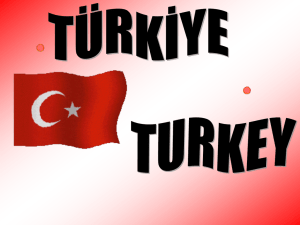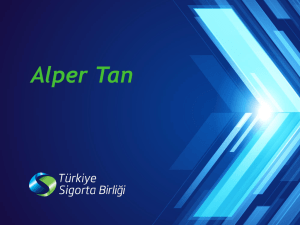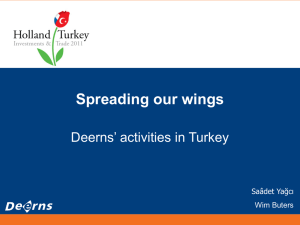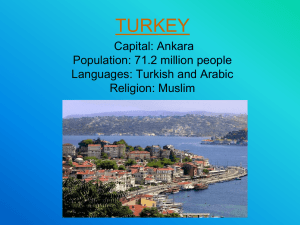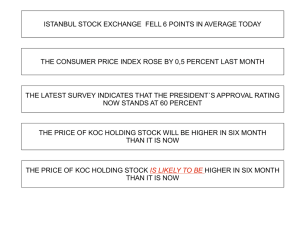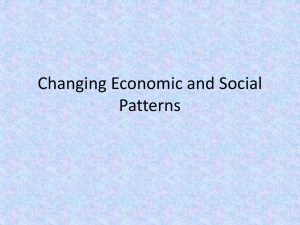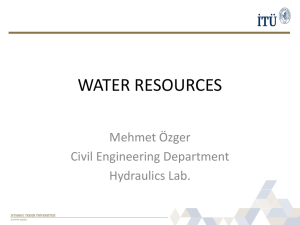here - Turkey
advertisement
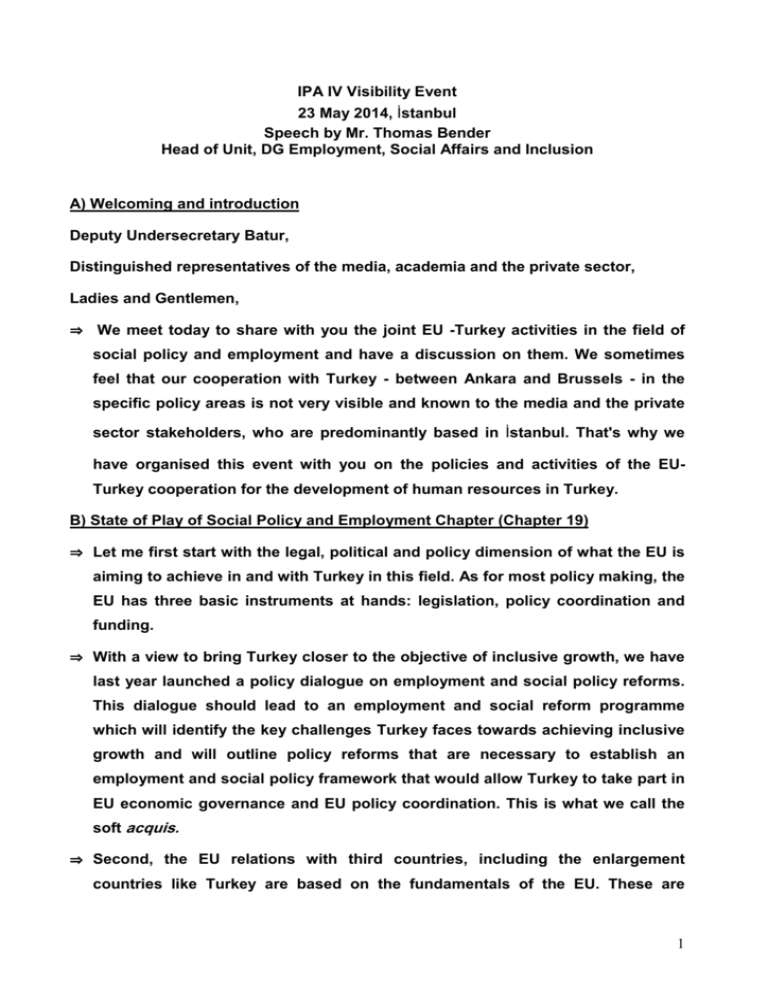
IPA IV Visibility Event 23 May 2014, İstanbul Speech by Mr. Thomas Bender Head of Unit, DG Employment, Social Affairs and Inclusion A) Welcoming and introduction Deputy Undersecretary Batur, Distinguished representatives of the media, academia and the private sector, Ladies and Gentlemen, ⇒ We meet today to share with you the joint EU -Turkey activities in the field of social policy and employment and have a discussion on them. We sometimes feel that our cooperation with Turkey - between Ankara and Brussels - in the specific policy areas is not very visible and known to the media and the private sector stakeholders, who are predominantly based in İstanbul. That's why we have organised this event with you on the policies and activities of the EUTurkey cooperation for the development of human resources in Turkey. B) State of Play of Social Policy and Employment Chapter (Chapter 19) ⇒ Let me first start with the legal, political and policy dimension of what the EU is aiming to achieve in and with Turkey in this field. As for most policy making, the EU has three basic instruments at hands: legislation, policy coordination and funding. ⇒ With a view to bring Turkey closer to the objective of inclusive growth, we have last year launched a policy dialogue on employment and social policy reforms. This dialogue should lead to an employment and social reform programme which will identify the key challenges Turkey faces towards achieving inclusive growth and will outline policy reforms that are necessary to establish an employment and social policy framework that would allow Turkey to take part in EU economic governance and EU policy coordination. This is what we call the soft acquis. ⇒ Second, the EU relations with third countries, including the enlargement countries like Turkey are based on the fundamentals of the EU. These are 1 reflected in the existing EU set of laws and rules (‘EU acquis’).Under the chapter called "Social Policy and Employment", we deal with issues like labour law, health and safety at work, social dialogue, employment policy, equal opportunities, social protection, social inclusion and anti-discrimination. ⇒ We have been following up the developments on these issues in Turkey and report on them annually at the European Commission's Progress Report on Turkey. ⇒ At the same time, we continue our dialogue with the Turkish counterparts, in particular the Ministry of Labour and Social Security, with a view to achieve progress and be able to process to Council opening this chapter for negotiations. ⇒ As you know, the EU Council sometimes puts benchmarks for opening a certain chapter for negotiations. For this chapter, there are two opening benchmarks. One benchmark is about trade union rights. As you know, the right to be able to join trade unions, to engage in collective bargaining and to participate in trade union activities is a fundamental right, which is e.g. enshrined in the EU Social Charter. ⇒ There is a tendency amongst many people both inside and outside Turkey to think that trade Union Rights can be neglected or overlooked at times of economic and financial crisis. Or to think that strong trade union rights are an obstacle to the competitiveness of companies or of national economies. ⇒ Evidence shows, however, that the most robust economies within the EU are precisely those with strong industrial relations tradition, and champions of trade union rights. It has been proven by considerable research that the more workers are engaged in decent and quality work, the more efficient and productive they are. And to make a link to the tragic Soma mine accident, a functioning social dialogue and the presence of trade union representatives at the workplace also contribute to increasing Health and Safety at the workplace. This is, by the way, an area in which the G20 employment task force under the co-lead of Turkey makes currently a contribution to safer workplaces globally. 2 ⇒ Coming back to chapter 19, the benchmark for opening negotiations in this Chapter requires Turkey to align its legislation and implementation with the European standards and ILO Conventions. Following many years of discussions within Turkey and between Turkey and the EU, The government adopted in 2012 two pieces of legislation for the employees in the private and public sectors. In order to discuss further about this legislation and identify any gaps and areas for further work, a High Level Working Group has been established between Turkey and the European Commission. We have had the last meeting of this Working Group two days ago here in İstanbul and agreed on further steps to be taken by Turkey. Therefore, I would say that our cooperation with Turkey on the policy and political level continues and yields concrete results. C) The Human Resources Development Programme (IPA IV) ⇒ Let me now turn to the funding and to what the EU is doing to financially support Turkey in the areas of employment, education and social inclusion. ⇒ Since 2007, Turkey is benefitting from EU financial assistance under a general framework called Instrument for Pre-Accession Assistance, the so-called "IPA", with an envelope of 4.8 billion EUR for the period 2007-2013. ⇒ IPA has a dedicated component for the human resources development. This Programme, the "Human Resources Development Operational Programme (HRD OP)", has three main components: employment, education and social inclusion. ⇒ Under employment, we focus on attracting and retaining more young people and more women in employment; while improving public employment services and promoting registered, decent work conditions for employees. ⇒ Under education, we try to improve access to quality vocational education, especially for girls, and we try to improve the functioning of the vocational qualifications system in the country. On the other hand, we aim to improve the adaptability of Turkish workers and companies, by developing their work related skills, in the light of rapidly changing global environment. ⇒ Under the social inclusion component, we try to eliminate the unfavourable circumstances of all disadvantaged individuals of groups, subject to exclusion 3 and discrimination, and to ensure equal opportunities in access to public services such as education and employment. Our target groups here include, among others, people with disabilities, individuals in poverty, working children, women subject to violence and Roma. ⇒ As you may see, the Programme touches upon key issues which directly affect the daily lives of Turkish citizens. ⇒ For the period 2007-2013, the EU has allocated around €475 million for this Programme from its own budget. This Programme uses mostly "soft investments", such as training, consultancy and guidance services, networking activities, internships, on the job trainings and others, to reach our common objectives. ⇒ The essential part of the interventions we make is made up of small-scale grant projects. These are projects implemented by not-for-profit organisations such as NGOs, local authorities, trade unions, employers’ organisations, schools or universities. They are good examples of how civil society participation is essential to solve the social challenges we face. Under the HRD OP, more than 430 grant projects have been implemented since 2010. New projects will start very soon on improving quality of vocational education and training, improving girl's enrolment to schools, promoting youth employment and promoting registered employment. ⇒ We can also provide grants directly to individuals in certain circumstances. An example is the scholarships we have provided to 20.000 Turkish university students with economic difficulties. These are the students who had applied to YURTKUR for scholarship, but were in the waiting list due to budget limitations. This way we are complementing a national scheme with EU funds to reach the common purpose of promoting access to education of students-in-need. ⇒ Furthermore, as an innovative methodology, a credit enhancement mechanism for women entrepreneurs, to be made available via private banks, has been established. The operation includes also business advisory services for women-led businesses and women who would like to become entrepreneurs. 4 The total budget of the operation amounts to € 38 million, but the total volume for credits expected to reach € 500 million. ⇒ Another important tool in implementation of the Programme is the use of Technical Assistance contracts. We have so far supported public bodies for relevant capacity building and to improve their services in the thematic priorities of the programme. These bodies include, among others, Turkish Employment Agency, Ministry of National Education and Social Security Institution, Ministry of Tourism and Culture, Ministry of Family and Social Policies, TOBB, TESK, and so on. ⇒ I will not go into details of everything we do, but you will see some concrete examples of how EU-Turkey cooperation contributes to Turkey's overall accession process and affects the daily lives of Turkish citizens in the presentation which my colleague Mr. Menendez-Bonilla will make shortly. D) Closing messages ⇒ Allow me to conclude by stating that the achievement of objectives of any financial cooperation requires the partnership with all relevant stakeholders, including yourselves. Partnership is the genuine involvement of all segments of the society which are concerned by human resources development in this country. We talk about economic and social partners, local authorities, NGOs, civil society, private sector, bodies responsible for promoting equality between men and women, and of course the media. ⇒ We hope to get more media coverage and have media to disseminate information regarding our activities so that wider segments of the society is informed and get the chance to participate in the project activities, trainings, etc. ⇒ Private employment agencies and human resources companies provide a considerable amount of job matching in this country, especially for the skilled labour force. While we are supporting İŞKUR - Turkey's public employment agency - to better deliver its services especially to the vulnerable groups and those people who are difficult to reach, the private employment agencies have 5 the potential to serve the majority of the labour force with no cost to the State. Especially if temporary agency work was allowed in Turkey, according to the relevant EU Directive, the role that these agencies would significantly increase. ⇒ Your inputs will also allow us to better understand the skills needed in the labour market, the skills that are available and missing, so that we can better design employment and education programmes to fill existing gaps. ⇒ Finally, we have here the representatives of companies which take the lead in Turkey for corporate social responsibility projects. We can discuss how we can establish better links with our projects and support each other's activities. ⇒ Let me conclude with confirming the EU's commitment to continue working with Turkey in the three fields I mentioned: the policy dialogue to embark on a reform agenda in the employment and social fields; the work on bringing the Turkish legal framework in line with the EU set of rules; and finally the provision of financial support, not least to underpin our joint efforts in the policy and legal environment. ⇒ Thank you again for your participation and contributions. 6


